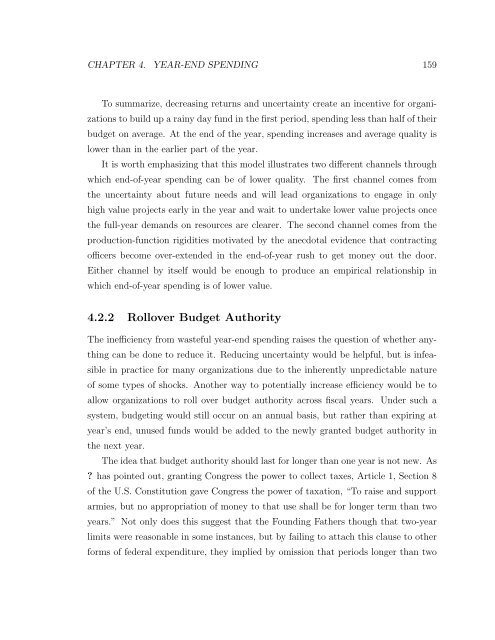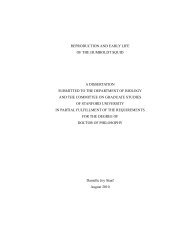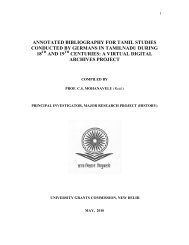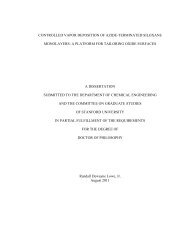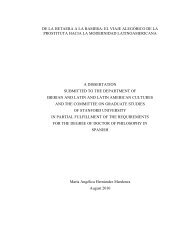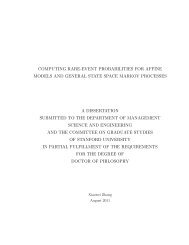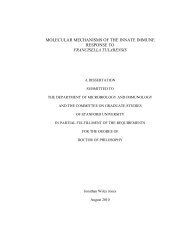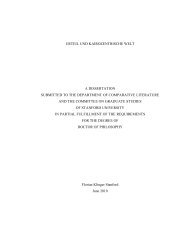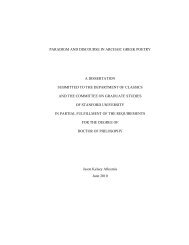essays in public finance and industrial organization a dissertation ...
essays in public finance and industrial organization a dissertation ...
essays in public finance and industrial organization a dissertation ...
Create successful ePaper yourself
Turn your PDF publications into a flip-book with our unique Google optimized e-Paper software.
CHAPTER 4. YEAR-END SPENDING 159<br />
To summarize, decreas<strong>in</strong>g returns <strong>and</strong> uncerta<strong>in</strong>ty create an <strong>in</strong>centive for organi-<br />
zations to build up a ra<strong>in</strong>y day fund <strong>in</strong> the first period, spend<strong>in</strong>g less than half of their<br />
budget on average. At the end of the year, spend<strong>in</strong>g <strong>in</strong>creases <strong>and</strong> average quality is<br />
lower than <strong>in</strong> the earlier part of the year.<br />
It is worth emphasiz<strong>in</strong>g that this model illustrates two different channels through<br />
which end-of-year spend<strong>in</strong>g can be of lower quality. The first channel comes from<br />
the uncerta<strong>in</strong>ty about future needs <strong>and</strong> will lead <strong>organization</strong>s to engage <strong>in</strong> only<br />
high value projects early <strong>in</strong> the year <strong>and</strong> wait to undertake lower value projects once<br />
the full-year dem<strong>and</strong>s on resources are clearer. The second channel comes from the<br />
production-function rigidities motivated by the anecdotal evidence that contract<strong>in</strong>g<br />
officers become over-extended <strong>in</strong> the end-of-year rush to get money out the door.<br />
Either channel by itself would be enough to produce an empirical relationship <strong>in</strong><br />
which end-of-year spend<strong>in</strong>g is of lower value.<br />
4.2.2 Rollover Budget Authority<br />
The <strong>in</strong>efficiency from wasteful year-end spend<strong>in</strong>g raises the question of whether any-<br />
th<strong>in</strong>g can be done to reduce it. Reduc<strong>in</strong>g uncerta<strong>in</strong>ty would be helpful, but is <strong>in</strong>fea-<br />
sible <strong>in</strong> practice for many <strong>organization</strong>s due to the <strong>in</strong>herently unpredictable nature<br />
of some types of shocks. Another way to potentially <strong>in</strong>crease efficiency would be to<br />
allow <strong>organization</strong>s to roll over budget authority across fiscal years. Under such a<br />
system, budget<strong>in</strong>g would still occur on an annual basis, but rather than expir<strong>in</strong>g at<br />
year’s end, unused funds would be added to the newly granted budget authority <strong>in</strong><br />
the next year.<br />
The idea that budget authority should last for longer than one year is not new. As<br />
? has po<strong>in</strong>ted out, grant<strong>in</strong>g Congress the power to collect taxes, Article 1, Section 8<br />
of the U.S. Constitution gave Congress the power of taxation, “To raise <strong>and</strong> support<br />
armies, but no appropriation of money to that use shall be for longer term than two<br />
years.” Not only does this suggest that the Found<strong>in</strong>g Fathers though that two-year<br />
limits were reasonable <strong>in</strong> some <strong>in</strong>stances, but by fail<strong>in</strong>g to attach this clause to other<br />
forms of federal expenditure, they implied by omission that periods longer than two


